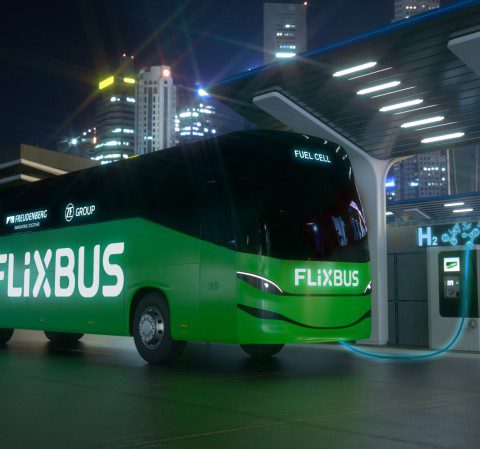Long-distance truck and coach market according to Interact Analysis: an ‘electrification battle’ between battery-electric and H2 technology
Heavy-duty commercial vehicles, being them trucks of coaches, will continue to be diesel-powered for a few years. Anyhow, «In the long term, we’re looking at an electrification battle between battery electric and hydrogen fuel cell technology in this sector». Who is going to win? «In the wider commercial vehicle space, battery electric leads the field. […]

Heavy-duty commercial vehicles, being them trucks of coaches, will continue to be diesel-powered for a few years. Anyhow, «In the long term, we’re looking at an electrification battle between battery electric and hydrogen fuel cell technology in this sector». Who is going to win? «In the wider commercial vehicle space, battery electric leads the field. And this gives the industry a high momentum in terms of innovation. Battery electric also enjoys two other key benefits over hydrogen fuel cell tech: simpler powertrains and higher energy efficiency».
Interact Analysis‘ consultant Jamie Fox shared its opinion on the development of the long-distance commercial vehicle segment in a insight published on the consulting firms’ website.

Battery application to leave room for H2 over 500 miles range
Having said the above, there’s a but: «When we look at larger vehicles – with ranges of 500+ miles – it could theoretically go either way. One issue is that such ranges will always be a challenge for electric batteries. That’s because battery technology is quite mature when it comes to power density. Batteries aren’t going to get much smaller, so making them work at these ranges will require either huge heavy batteries in trucks, or an efficient battery swapping system, or an acceptance that long-haul trucks will need to recharge quite often – perhaps every 150 miles. If very large batteries are used, it will also require megawatt charging pumps to be installed across wide areas – an expensive infrastructure proposition». As a matter of fact, a giant like Flixbus is working on hydrogen, with the first vehicles to be on a pilot in Europe by 2024.
Looking at financing schemes put in place all over the world, «China’s New Energy Automobile Industry Plan (2021-2035) has the goal of 20% of vehicle sales to be zero emission by 2025 and the China Society of Automotive Engineers has set itself a goal of over 50% electric sales by 2035. This is bound to have a knock-on effect on the commercial sector. Meanwhile, the EU has the world’s strongest incentives and, even in the US, President Joe Biden’s Build Back Better program includes 30% tax credits for electric heavy duty vehicles». Developments that will impact surely on the truck market, but also on the (much smaller) coach segment.
Hydrogen technology, the issue is on infrastructure and production
«Hydrogen fuel cell technology can easily power the largest lorries – adds mr. Fox -. But heavy duty long-haul is probably the only market sector where hydrogen technology can work in the relatively near future. Additionally, hydrogen infrastructure is equally lacking in most geographical regions, and is going to be equally as expensive as electric infrastructure (or even more so). On top of this, the technology is significantly less efficient than battery electric and for it to make sense from a green perspective will require a major boost in green hydrogen production. The jury is still out, but my view is that battery electric has the better chance of winning this race».
E-buses: convenience on the long term
Which is the convenience point of e-buses? «The capital outlay for an electric vehicle currently always exceeds the cost of a traditional internal combustion vehicle, owing to the costs of R&D, the technology involved, and the lack of scale. But after a certain amount of mileage, the ROI tends to be high. It’s a case of investing up front and waiting for a payback. I would say that the majority of fleet managers who invest in electric commercial vehicles do so primarily for the cost benefits, rather than due to environmental considerations», reads the paper by Interact Analysis.
E-mobility and start-ups
Focusing on the emergence of new player in the e-bus builder landscape, the analyst’s opinion is straight: «If we look at buses, there won’t be much room for new start-ups: probably at least three or four of the current leading bus manufacturers will also become the leading electric bus manufacturers. The same is likely to be the case with truck manufacturers»








